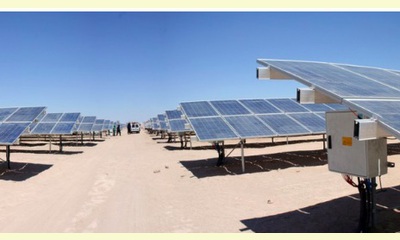|
|
Oil price crash won’t hurt renewable sector – analysts
un article par Megan Darby, RTCC (Responding to Climate Change)
Except in Saudi Arabia, the recent slump in oil
prices will have little impact on renewable
deployment, says Bloomberg. 
The oil price drop will have little impact on renewable energy deployment, say analysts (Pic: Flickr/Rodrigo Arancibia Zamora)
click on photo to enlarge
Saudi Arabia’s plans to build 41GW of solar power
by 2032 could be hit by the slumping oil price.
Other oil-producing nations that burn oil for
power, plus developing countries that use diesel
generators, will have less incentive to switch to
cleaner sources.
But on the whole, the drop from around US$115
to US$60 a barrel in six months will have a
minimal impact on renewable energy, according to
Bloomberg New Energy Finance.
On the contrary, chairman Michael Liebrich
argued a shift to clean energy was hitting oil
demand, driving the price down.
“The orthodox view of unlimited oil demand
growth simply does not hold in a world of super-
efficient engines, electric vehicles, desperate air
pollution problems, and action on climate,” he
said.
“The story should not be how falling oil prices will
impact the shift to clean energy, it should be how
the shift to clean energy is impacting the oil price.”
If low oil prices persist, Bloomberg analysts found,
the main impact will be in transport. Producers of
electric vehicles and biofuels will find it harder to
challenge petrol and diesel engines.
At US$100 a barrel, analysts forecast electric car
and vans will reach 9% of market share by 2020,
from less than 1% today. At US$60, electric
engines are expected to spread less fast, reaching
only 6%.
In power generation, on the other hand, clean
sources are usually not in direct competition with
oil.
Initially driven by targets and subsidies, wind and
solar technologies have got cheaper and are
increasingly cost-competitive with coal and gas-
fired generation.
Senior analyst Angus McCrone said cheap oil
could even help clean energy, by boosting
economic growth and easing pressure on
politicians to cut consumer costs.
“Cheaper crude should be a pick-me-up for
consumer confidence and economic growth in oil-
importing regions such as Europe, India, Japan
and China,” said McCrone.
“This could, in turn, push up power demand,
reduce political angst about energy bills, and
increase the scope for further investment in clean
energy.”
[Thank you to Janet Hudgins, the CPNN reporter
for this article.]
|








|
DISCUSSION
Il n'y pas encore de question liée à cet article.
* * * * *
Commentaire le plus récent:

|
|









